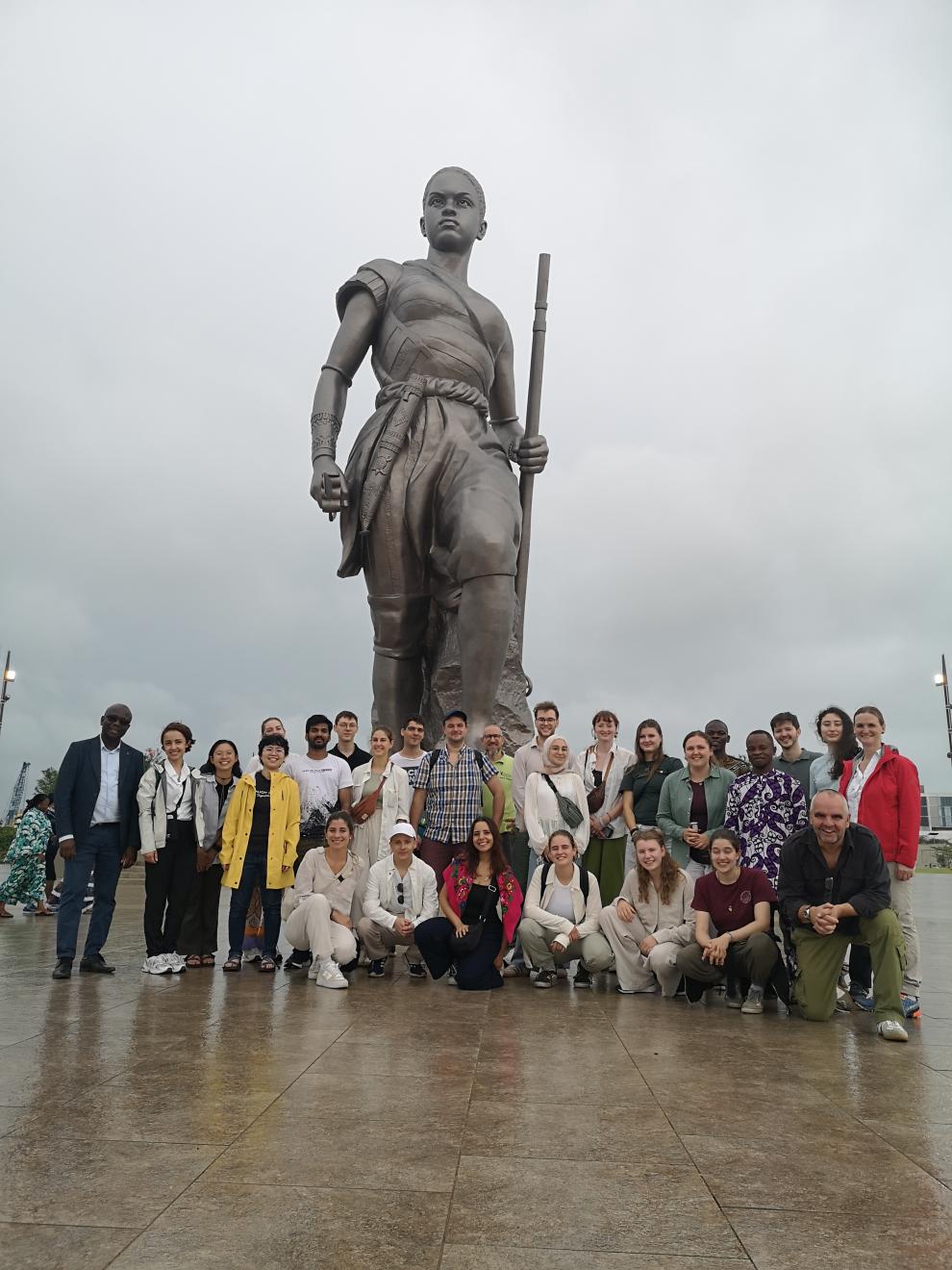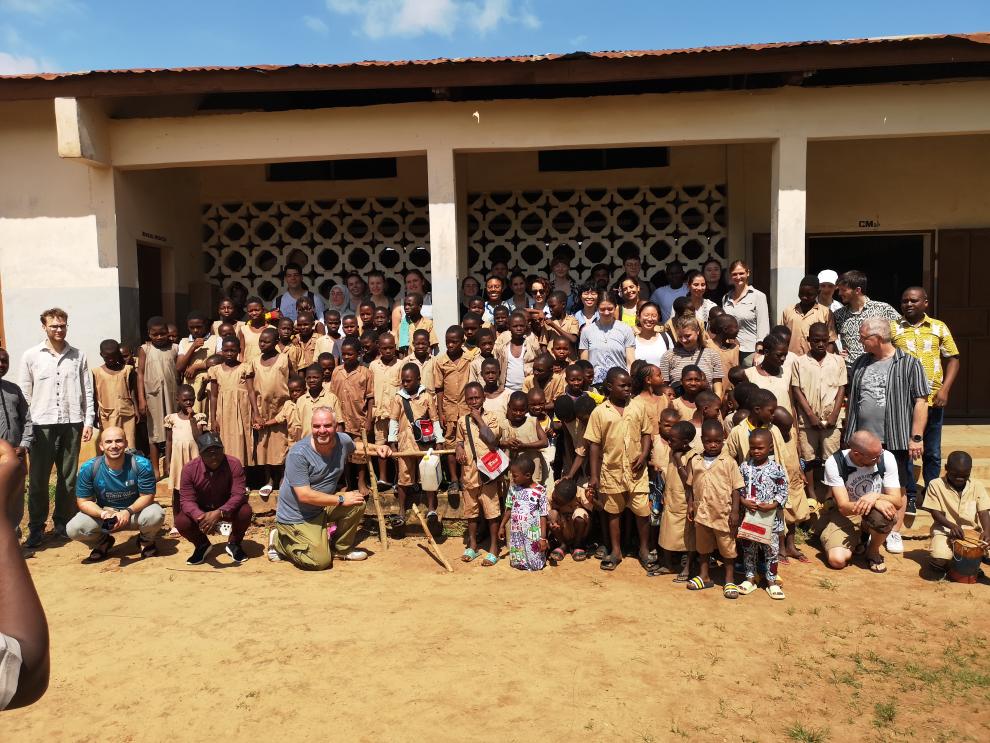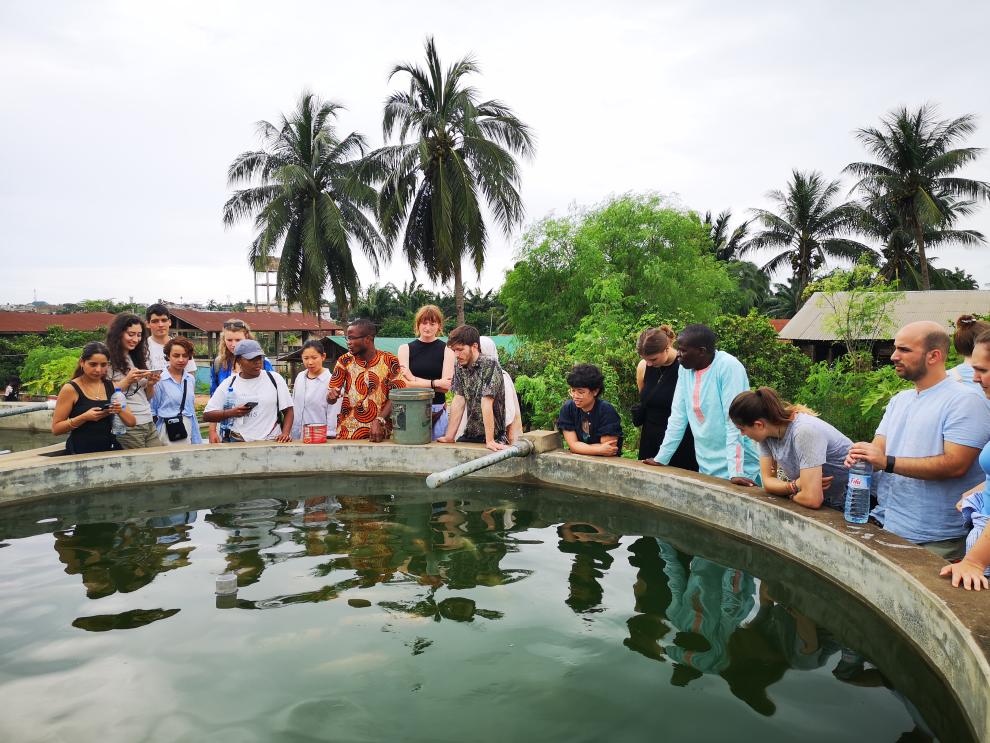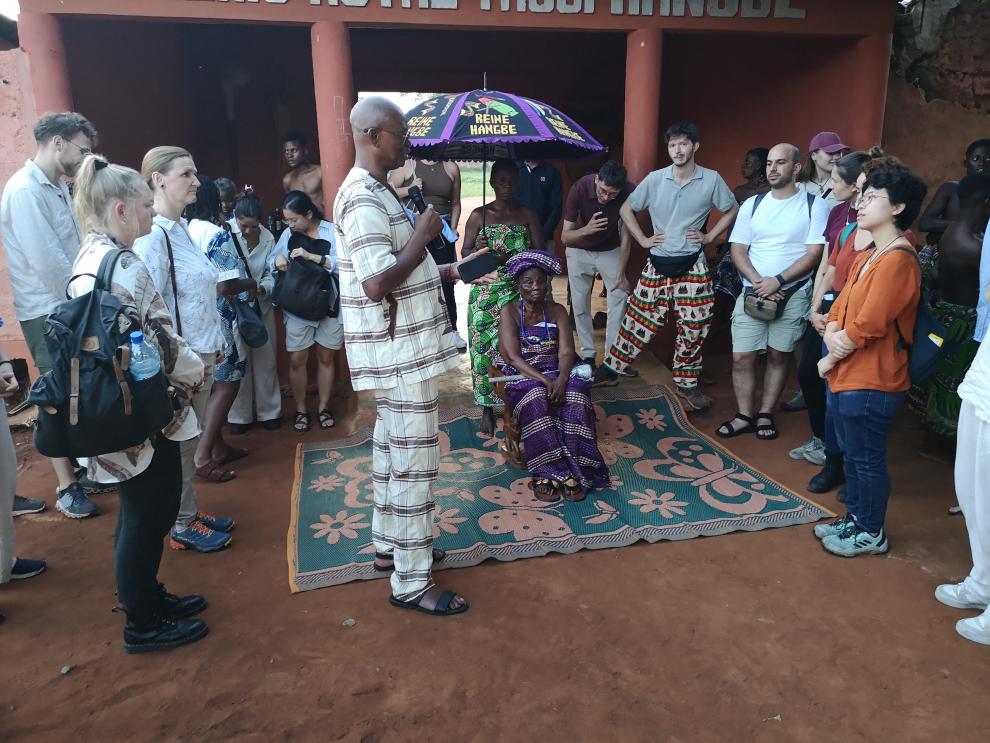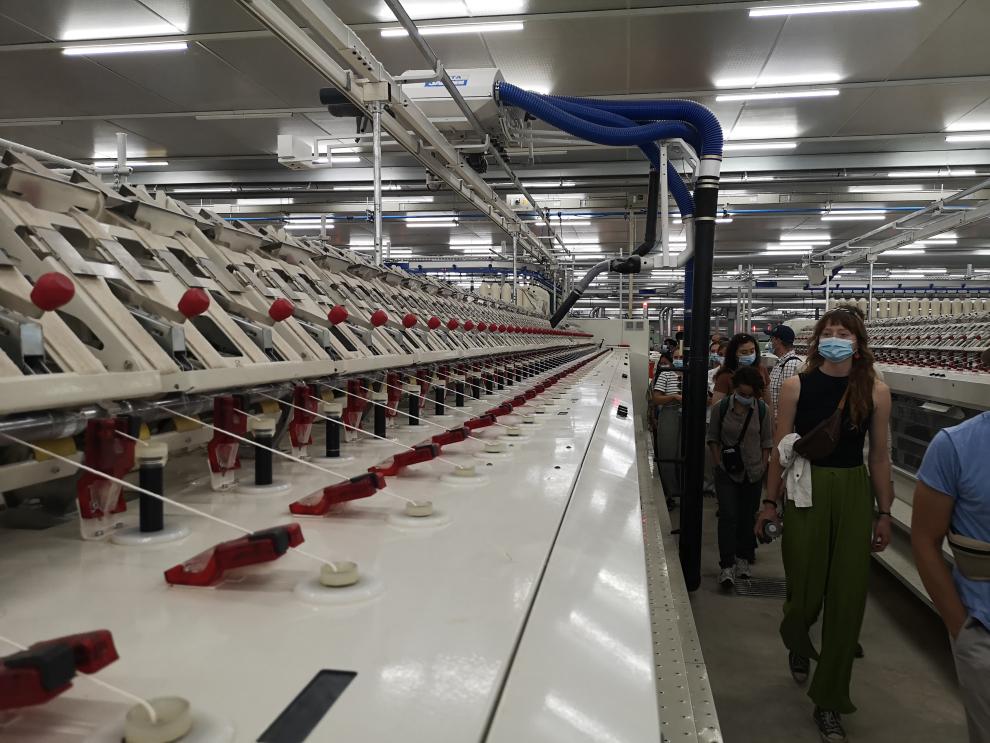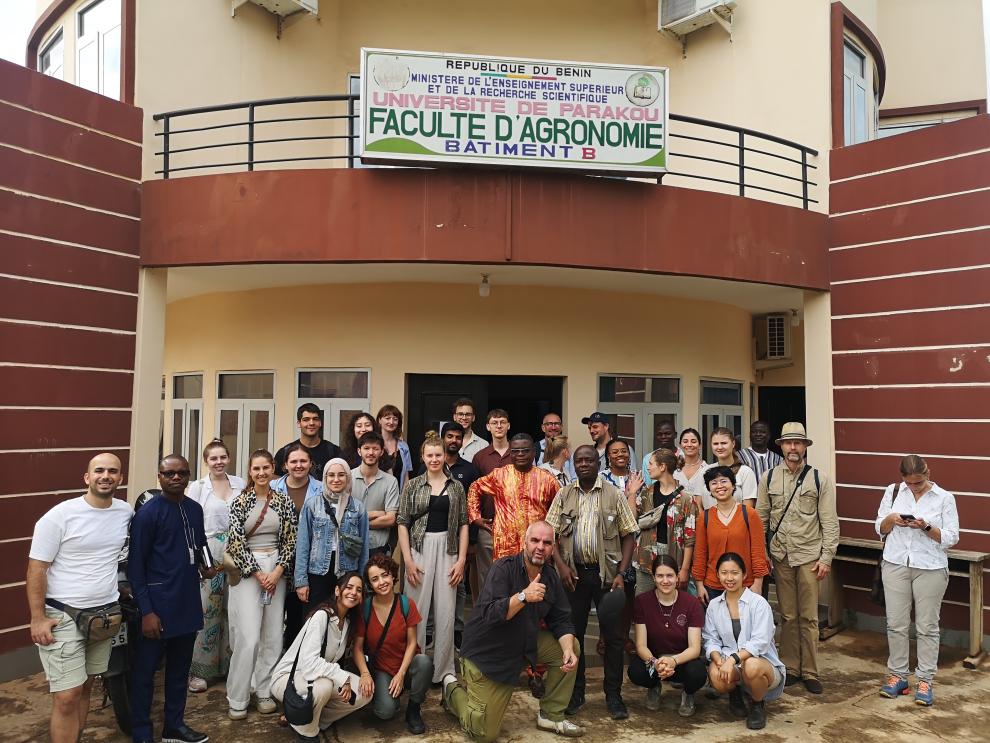Benin Excursion: Between Lecture Hall and Kingdom
The opening scene could hardly be more contrasting: Here, the campus of Rhine-Waal University of Applied Sciences in Kleve—clean lines, glass, concrete, knowledge organized in module handbooks. There, Cotonou, Benin’s economic metropolis—a symphony of car horns, the scent of grilling food, damp earth, mopeds zigzagging through traffic. Between them lie roughly 5,000 kilometers as the crow flies and a universe of experiences, which 23 students and five professors from the Faculties of Life Sciences and Society and Economics made their lecture hall for twelve days.
This is no tourist outing, but an expedition into the concrete. At its center lies something found in no syllabus: a shift in perspective. Professor Matthias Kleinke summarizes the goal succinctly: Learning that doesn't stop at theory. Testing assumptions, recognizing nuances, sensing connections. What happens when an academic curriculum leaves its protected spaces and encounters the complex, contradictory, fascinating reality of West Africa? This journey provides answers.
The university has cultivated contacts in sub-Saharan Africa for years, and Benin offered a network that opened doors. A key figure is Achille Assogbadjo, who was at HSRW as part of the Alexander von Humboldt Foundation’s renowned Georg Forster Research Award in 2023 and is now a professor at the Université d’Abomey-Calavi. Through him, a visit becomes an exchange: access to universities, projects, and society—a conversation on equal footing rather than just an itinerary item.
The scientific bridge is the Baobab. The African baobab tree is at the center of the BaoFood and BaoQuality projects. They track the entire value chain—ecology, genetic diversity, sustainable harvesting, and the marketing of its nutrient-rich fruit.
The goal: to strengthen food security in arid regions and stabilize the incomes of local communities. Application-oriented research that connects ecology with economics—this is the university’s DNA. The excursion was deliberately interdisciplinary. Alongside students from almost all disciplines within the Faculty of Life Sciences, students of International Relations and Gender and Diversity also joined the trip. This mix sharpened the focus. Agriculture, development, traditions, climate change—here, they are not separate topics, but an interconnected web. The university, international and practical, relocated its mission to the field for twelve days.
About 45 kilometers northwest of Cotonou, on red soil and amidst palm trees, a project is growing that aims to reorder Benin’s future: the Glo-Djigbé Industrial Zone (GDIZ). On 1,600 hectares, an industrial and logistics hub of rare ambition is emerging in a partnership between the State of Benin and the pan-African developer ARISE IIP. The idea is as simple as it is radical: an end to the model of exporting raw materials cheaply and leaving the profits of processing elsewhere. Benin wants to keep the next steps of the value chain within the country. Instead of raw cotton: "Towels for the World." Textile machines are already running, and ceramic tiles are being produced—an object lesson in development economics.
The GDIZ thinks in ecosystems: industrial plants, commercial and residential areas, logistics, its own container terminal, truck parking, power, and water supply. A "Guichet Unique" (Single Window) bundles 13 authorities to streamline procedures. Focus sectors: processing of cashew, soy, pineapple; textiles from spinning to confection; wood processing; electronics assembly. A statement of economic sovereignty—and an invitation to re-examine old North-South narratives.
Tradition joins modernity. Anyone arriving in Benin with a large group quickly learns the protocol: First to the King to announce oneself and ask for blessings. The courts are colorful; the King sits under an artfully decorated umbrella—with insignia, not brand logos. Rituals included: a shared schnapps as a sign of respect.
These Kings are not absolutist rulers. Their authority is social and societal. They mediate, arbitrate, give advice—a low-threshold justice system, culturally anchored and often closer to everyday life than state institutions. Their legitimacy is spiritually grounded: It is not succession that decides, but the oracle.
Just how complex these orders are was shown by a court with a King and Queen who were not married and were never allowed to meet. The King with his own wife; the Queen with primarily religious duties. Benin is a parliamentary democracy—and at the same time a land of hybrid governance. Modern administration and ancient authority do not work against each other, but with each other. This creates local legitimacy and resilience that no central state can generate alone.
Those coming from the Lower Rhine initially look at Benin’s fields with confusion. No precise rectangles, but diversity in tiers: agroforestry. Orange trees above, pineapples below; shade, moisture, biodiversity—a system that seems chaotic but is highly efficient.
Markets are both a mandatory program and a textbook. There, "agricultural biodiversity" is spread out: cassava, yams, maize; mangoes, coconuts, pineapples. Freshly cut sugar cane is tasted, different pineapple varieties compared. Omnipresent: Cashew, as a tree landscape and an export good.
But agriculture is under pressure. Rainy and dry seasons are shifting, becoming unpredictable; droughts and heavy rains are increasing. In a country whose fields depend on rain, this is existential. Development organizations like the GIZ support with water management and climate-resilient cultivation methods—adaptation as daily practice.
A bridge back home is built by the association pro dogbo e.V., founded in Kleve in 2002. In the Dogbo region, over 24 schools and training centers have been created with local partners and the student initiative Weitblick from Münster. In bakeries, automotive, and metal workshops, young people learn trades that support them. Solidarity that you can touch—and which shows how closely the Lower Rhine is connected to Benin.
Twelve days that resonate—even beyond the postcard motifs. Long drives over bumpy tracks, rain through the bus roof, minor health hitches: everyday travel in the tropics. What remains? For Professor Kleinke, two insights. First: the people of Benin. Their flexibility, joy of life, and composure in the face of difficulty. No one complains—a quiet contrast to the general mood in Germany.
Second: the group itself. Over twenty young people from eleven nations who travel, learn, argue, and laugh together. How effortlessly the world can function when you find a connection to one another. In times of polarization, this travel group became a small counter-draft—proof that curiosity and respect are the strongest antidotes to prejudice. In the end, excursions like this count among the highlights of a degree. A professor's suitcase may have only arrived on the penultimate day, but the actual baggage weighed more on the journey home: an expanded, differentiated, sustainably changed view of the world—and of one's own place in it.

